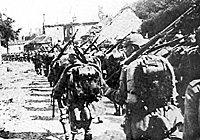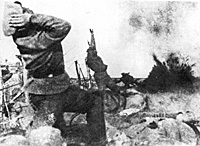
[Before the following article arrived, I was racking my brains for a subject to stir-up a bit of discussion. "I know!", I thought, "National Characteristics -- should they be part ofthe rules?" I can recall almost weekly arguments soon after I started wargaming in the early 70's. At that time, I was a vociferous opponent. Now, I believe, at least in the periods I regularly game, exactly the opposite. Training and drill manuals were different and emphasis on tactical formations and manoeuvring equally disparate - you have to reflect this in the rules otherwise why paint different uniforms on different armies? John Staverley seems to have some conflicting views about this and raises some other questions which I want to encourage the readership to write about - come on you lot: let's be 'avin' yer - Ed.]
Introduction
 German troops
German troops
The following arose from my need to cast players in various roles for a large scale wargame re-fight of "War in the East" as I grandly titled my re-enactment of the invasion of East Prussia in August 1914, cumulating historically in the battle of Tannenberg.
I soon realised that the issue I had identified was not unique to a specific period or battle so much as to wargarning in general and that it might be of interest to other wargamers.
In short: How much should an umpire build national characteristics (for want of a better expression) into the rules and how much should he circumvent the need for these by type casting players?
To Return to Tannenberg
A friend, more historically knowledgeable than I am, agreed that man for man at a fighting soldier level there seems to have been little to choose from between the Russian and German armies although "national characteristics" may have been relevant in some circumstances. There were differences. The Germans seemed to have been better trained, had genuine leadership available at a lower level, say NCO level, and possessed many of the almost caricature, well known Prussian qualities whilst the Russians seemed to accept more deprivation (they were used to it) and were generally dogged and/or stoic. At the lower levels they do not seemed to have lacked military competence.
My friend argued that the big difference between the Russians and Germans of 1914 seems to have been in the quality of command. The Germans won by a more "with it" command team, tactical flexibility, better use of logistics (superiority/flexibility did allow them to pull off the 'Tannenberg manoeuvre' and the Russians couldn't have done this), better use of lines of communication and in general a more modern, professional approach.
However, my knowledge from the real world would suggest that whereas such comments may be true they are only an outward indication of what the situation has been built on at a higher level. At a higher level the Germans were simply better than the Russians. My argument is that the tactical flexibility, better use of lines of communication and so on were results and not causes of efficiency.
In the real world I work for one of the major banks. As a part of the bank's internal audit and control mechanisms each branch is routinely inspected once every 2 years or so. Years of inspection results have shown a very close correlation between the quality of the management at a branch and not only the quality of lending made but also the apparently unrelated fields of amount of overtime worked, banking hall cleanliness, staff turnover and even the shortage or surplus of soap in the toilets! Everything stems from the top.
This analysis translates back to the military and feels right although I've little hard evidence to back it. What do serving soldiers believe to be the case? Can anyone think of a situation where a good general officer hierarchy, who'd been in place long enough to have had an effect, were faced with poorly performing troops when the chips were down or viceversa?
To get deep and meaningful: Noone has ever died of AIDS. Deaths only occur because of the illnesses AIDS permits. These diseases are the killers.
What can we do?
I see wargamers as having two ways to replicate the national, cultural etc. differences that arise between armies.
Either differences can be built into the rules or players can be type cast into roles. Both methods have pros and cons.
Rules
Most rules have "national characteristics" built into them. The trouble is that rules have finite boundaries both for the time period involved and for the selection of sub- rules covered. Even with these broken down into smaller chunks (such as "for the period 1809-1812") the characteristics can get somewhat strained. It has even been plausibly argued that rules that go outside of "Rules for the Battle of Somewhere" are likely to be too generalist.
If sides are evenly balanced on the player front then any national difference needs to be factored (forced?) into the rules to have a chance of those rules giving a more historically plausible game and result. If there's a need for side A to be "better" than side B and if the players are much of a muchness then the rules have to cover this gap. Can they?
Roles
 Russian troops suffer heavily from the German shelling.
If players are typecast it is a lot
easier on the rule writer. There is no
need to try to incorporate all the
differences that can be thought of and
for these to be appropriately weighted.
With players the potential to be more
or less competent in fields not yet
invented is infinite! In general players'
competencies will go well beyond the
neat categories that rules are forced
by their nature to take - order passing,
movement, melee, morale etc.
Russian troops suffer heavily from the German shelling.
If players are typecast it is a lot
easier on the rule writer. There is no
need to try to incorporate all the
differences that can be thought of and
for these to be appropriately weighted.
With players the potential to be more
or less competent in fields not yet
invented is infinite! In general players'
competencies will go well beyond the
neat categories that rules are forced
by their nature to take - order passing,
movement, melee, morale etc.
At my club we have an individual who is renowned for throwing away cavalry. A different method is used each time but the end result is inevitably the same. No set of rules could ever hope to build in this player's varied reasons, rationales or excuses. If you need a commander who is likely to throw away cavalry then forget the rules, XXX is your man.
A second individual regularly drifts away mid wargame to play pinball. Even this must have its uses!
The trouble is that players rarely fit all the roles required and in any event, who still games with Fred, the total incompetent, every time?
 Four lie dead or wounded before the Russian advance even gets past the first obstacle.
Four lie dead or wounded before the Russian advance even gets past the first obstacle.
Comments
Let's assume that all players have the same 20th Century background. The loss of face, adherence to doctrine, class expectancy, social attitude etc. which is what is really meant by "national characteristics" won't really be present. In an ideal world I reckon that you could do a game, with no difference in the rules, between two differing armies if it were possible to accurately typecast each side. There would be a fairly historical game and outcome regardless of the rules used. Rules would then become the simple mechanics for calculating physical effects such as "fire" and "melee" that they were originally.
As the world stands any rules alterations for different sides must be finite. The factors for Side B may make it slower to pass orders, react to events etc. In an ideal world it makes more sense to let the players incorporate differences by they themselves being different. Rules can only differ in a set number of ways and "good" players commanding "bad" armies will try, legitimately (?), to work round an army's weaknesses. Is this in itself realistic?
From my understanding armies are rarely aware of their shortcomings, though not always differences, from the enemy. It is very rare to discuss the way things are. Eastern Europeans may marvel at the variety of food in a typical UK supermarket but Mr and Mrs Normal rarely notice when shopping. That's the way things are. Both cultures build recipes around the "norm", their individual circumstances, and not around "what ifs".
In wargame terms, for example, if army B's orders take longer to change than army A's for one reason or another then a player might allow for this when planning. By comparison, another player would naturally take longer to think of changing his orders and so no rule difference would be needed. The player would quite naturally not think of it until too late. Which player is more representative of the army that he is commanding? Who is the "better" player?
Do your players see rules as something to guide a game or as another thing to be "beaten"? I'm not talking about the rules lawyers (shoot them) but the individual who can see that if it takes a whole move to change formation then he can't rely on last minute changes. Troops had better be in the formation they will need to be in at least a move or two before it might matter. They won't get caught out as their real life compatriots might have. Which aspect of this army's experience are the rules trying to replicate or have we thrown away all pretence of replicating history and brought the wargame to the level of being just another game?
And Finally
There doesn't seem to be an answer. I'd welcome feedback but I guess until such time as someone brings to life the great commanders of the past and asks them if they'd like a wargame (and gets them to say "yes") we'll never know.
(They'd also have to agree that the game was a valid representation of a battle and that is a whole new kettle of fish.)
Back to Battlefields Vol. 1 Issue 8 Table of Contents
Back to Battlefields List of Issues
Back to Master Magazine List
© Copyright 1999 by Partizan Press.
This article appears in MagWeb (Magazine Web) on the Internet World Wide Web.
Other military history articles and gaming articles are available at http://www.magweb.com